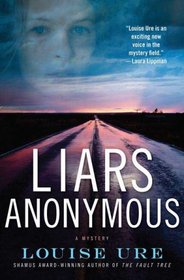Helpful Score: 1
First Line: I got away with murder once, but it doesn't look like that's going to happen again.
Roadside assistance operator Jessie Dancing receives a call from a driver in Tucson who sounds as if he's being murdered. Not content to let the police handle the situation, Jessie takes a copy of the tape to the driver's wife who tells her that her husband is very much alive. Taking some time off from her job in Phoenix, Jessie finds that being home in Tucson is bringing her past back to haunt her-- a past that includes being acquitted for murder. During the course of her own investigation, a young woman Jessie meets near the site of the driver's phone call is blown up in her car, and Jessie is once more dealing with a world in which guilt and innocence are both slightly out of focus.
Ure is no stranger to the Sonoran Desert, as you can see from passages like this:
"The steering wheel on Bonita's car was so hot that I wished I had oven mitts. It wasn't supposed to be this hot in September. We should have been on Simmer by now, not Deep Fry. I guided the VW to the freeway with a delicate two-finger grip that would at least cut down on the number of blisters."
Two fingers, Jessie? I've learned to drive with one fingertip! (That way only one fingerprint is burned beyond recognition.)
I enjoy Ure's writing for the setting and for the convoluted plots centered around one very conflicted main character. The more I read about Jessie, the more I realized just how damaged she was. For most people, the setting, the pacing, the plot and the main character are going to be strengths leading to enjoyable reads.
In my case, I've come to the conclusion that I'm going to have to agree to disagree. I can see all these good things as I read, but in Ure's last two books, The Fault Tree and here in Liars Anonymous, she's created two conflicted characters that drive me crazy. The main character in The Fault Tree was raised to accept blame for everything that happened. It didn't take long for me to stop feeling compassionate and to start wanting to tell her to put on her big girl panties and deal with it. I had roughly the same reaction to Jessie in this book. Jessie's childhood somehow seemed to teach her that no one was going to listen to her, and if she saw wrong being done, she was going to have to take care of it herself. However, it's never a good idea to take the law into your own hands, no matter how much Jessie disagrees with me.
While I found Jessie to be exasperating and infuriating, that doesn't mean you will. Louise Ure is an excellent writer who is skilled at intricate plots and interesting characters. Don't be afraid to give her a try just because this curmudgeon is sometimes easily irritated!
Roadside assistance operator Jessie Dancing receives a call from a driver in Tucson who sounds as if he's being murdered. Not content to let the police handle the situation, Jessie takes a copy of the tape to the driver's wife who tells her that her husband is very much alive. Taking some time off from her job in Phoenix, Jessie finds that being home in Tucson is bringing her past back to haunt her-- a past that includes being acquitted for murder. During the course of her own investigation, a young woman Jessie meets near the site of the driver's phone call is blown up in her car, and Jessie is once more dealing with a world in which guilt and innocence are both slightly out of focus.
Ure is no stranger to the Sonoran Desert, as you can see from passages like this:
"The steering wheel on Bonita's car was so hot that I wished I had oven mitts. It wasn't supposed to be this hot in September. We should have been on Simmer by now, not Deep Fry. I guided the VW to the freeway with a delicate two-finger grip that would at least cut down on the number of blisters."
Two fingers, Jessie? I've learned to drive with one fingertip! (That way only one fingerprint is burned beyond recognition.)
I enjoy Ure's writing for the setting and for the convoluted plots centered around one very conflicted main character. The more I read about Jessie, the more I realized just how damaged she was. For most people, the setting, the pacing, the plot and the main character are going to be strengths leading to enjoyable reads.
In my case, I've come to the conclusion that I'm going to have to agree to disagree. I can see all these good things as I read, but in Ure's last two books, The Fault Tree and here in Liars Anonymous, she's created two conflicted characters that drive me crazy. The main character in The Fault Tree was raised to accept blame for everything that happened. It didn't take long for me to stop feeling compassionate and to start wanting to tell her to put on her big girl panties and deal with it. I had roughly the same reaction to Jessie in this book. Jessie's childhood somehow seemed to teach her that no one was going to listen to her, and if she saw wrong being done, she was going to have to take care of it herself. However, it's never a good idea to take the law into your own hands, no matter how much Jessie disagrees with me.
While I found Jessie to be exasperating and infuriating, that doesn't mean you will. Louise Ure is an excellent writer who is skilled at intricate plots and interesting characters. Don't be afraid to give her a try just because this curmudgeon is sometimes easily irritated!




